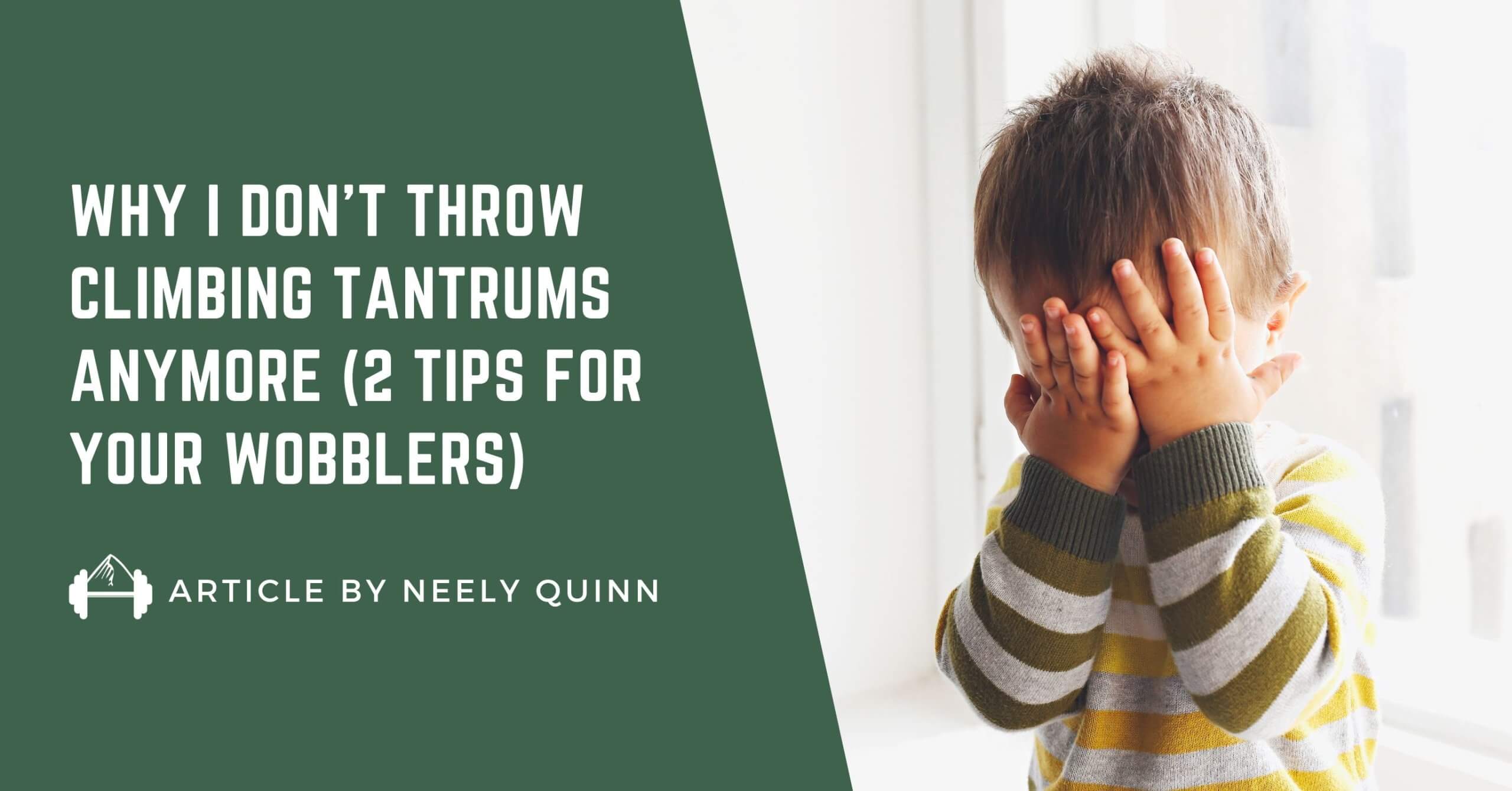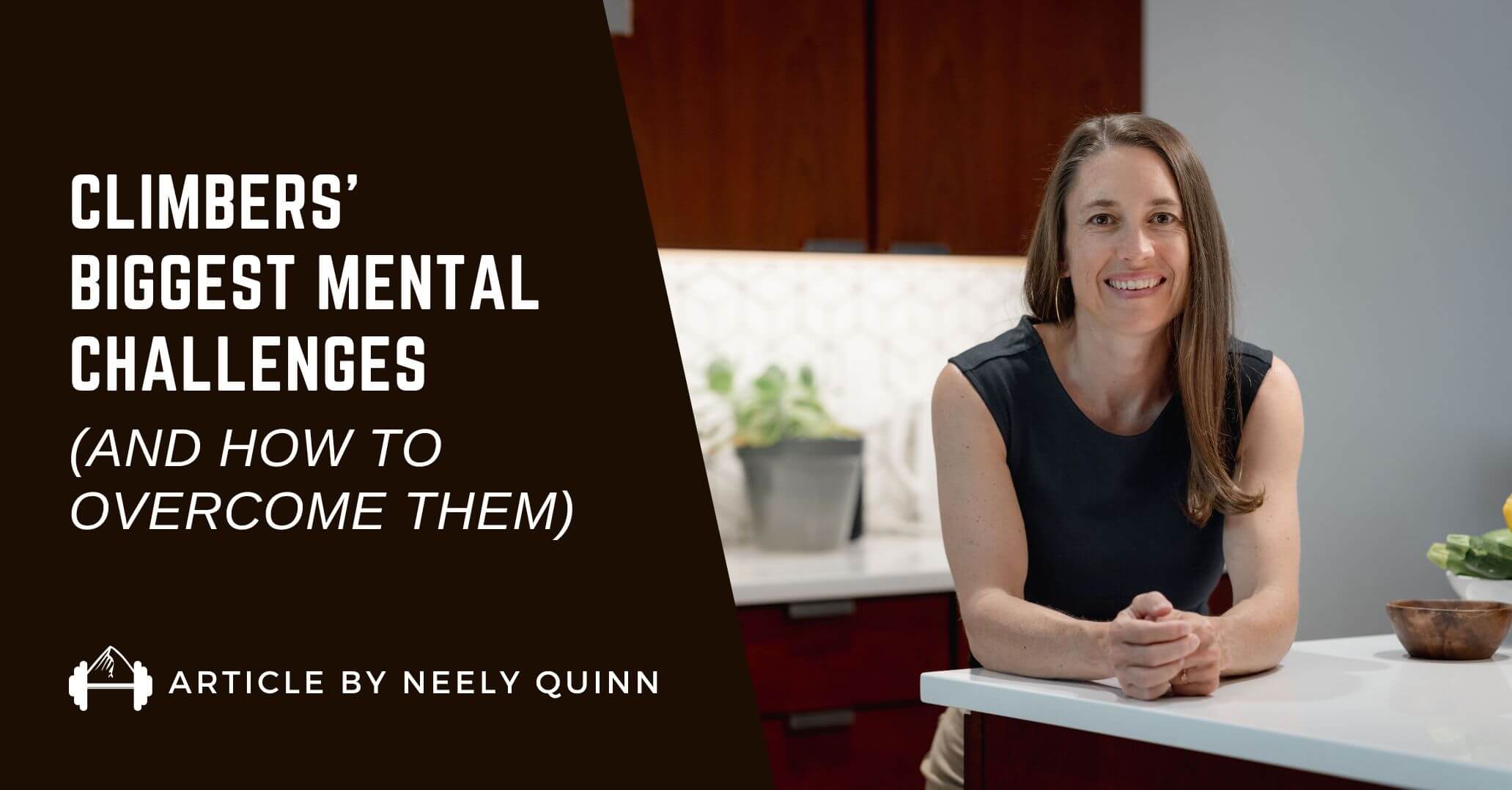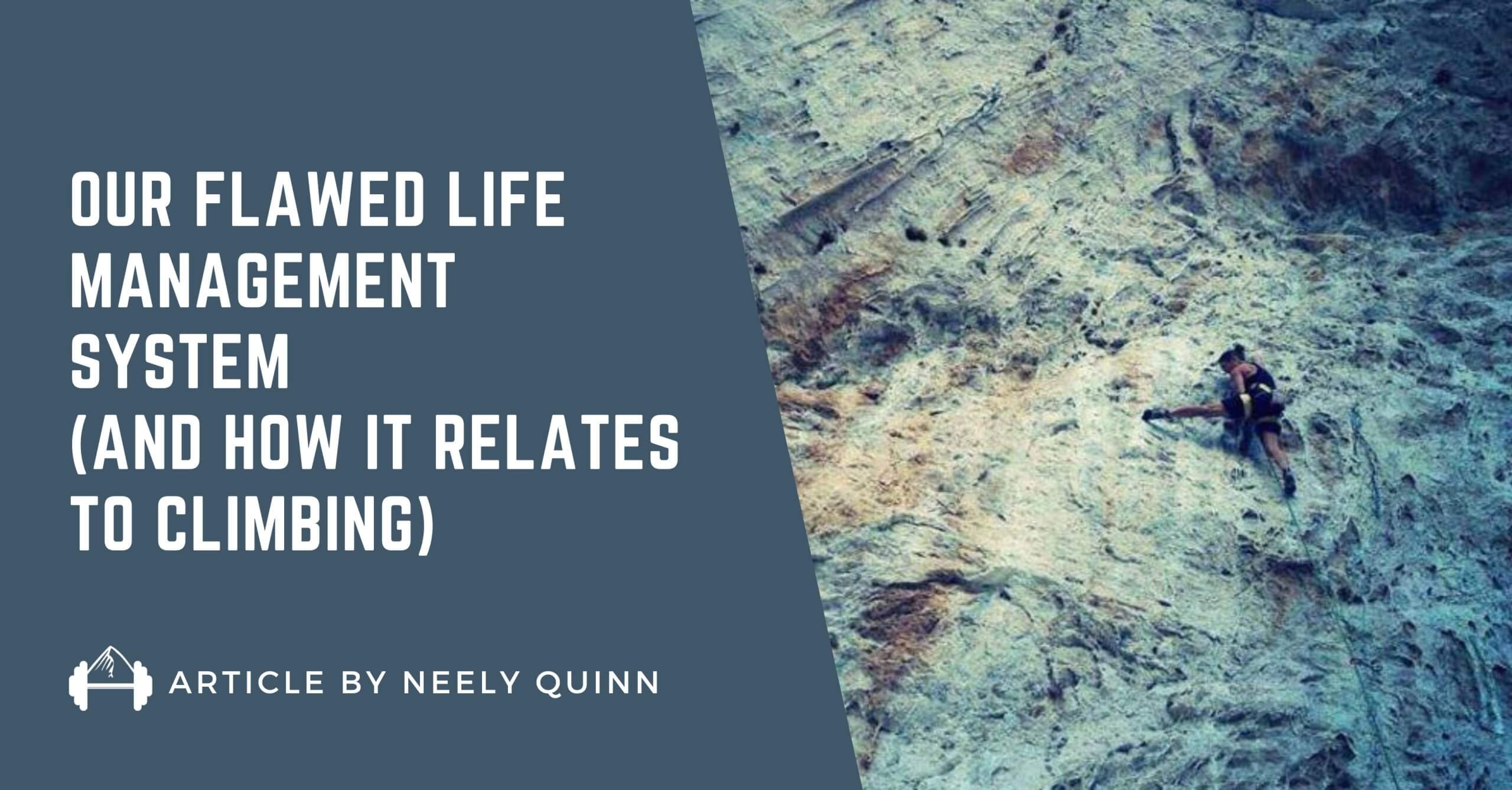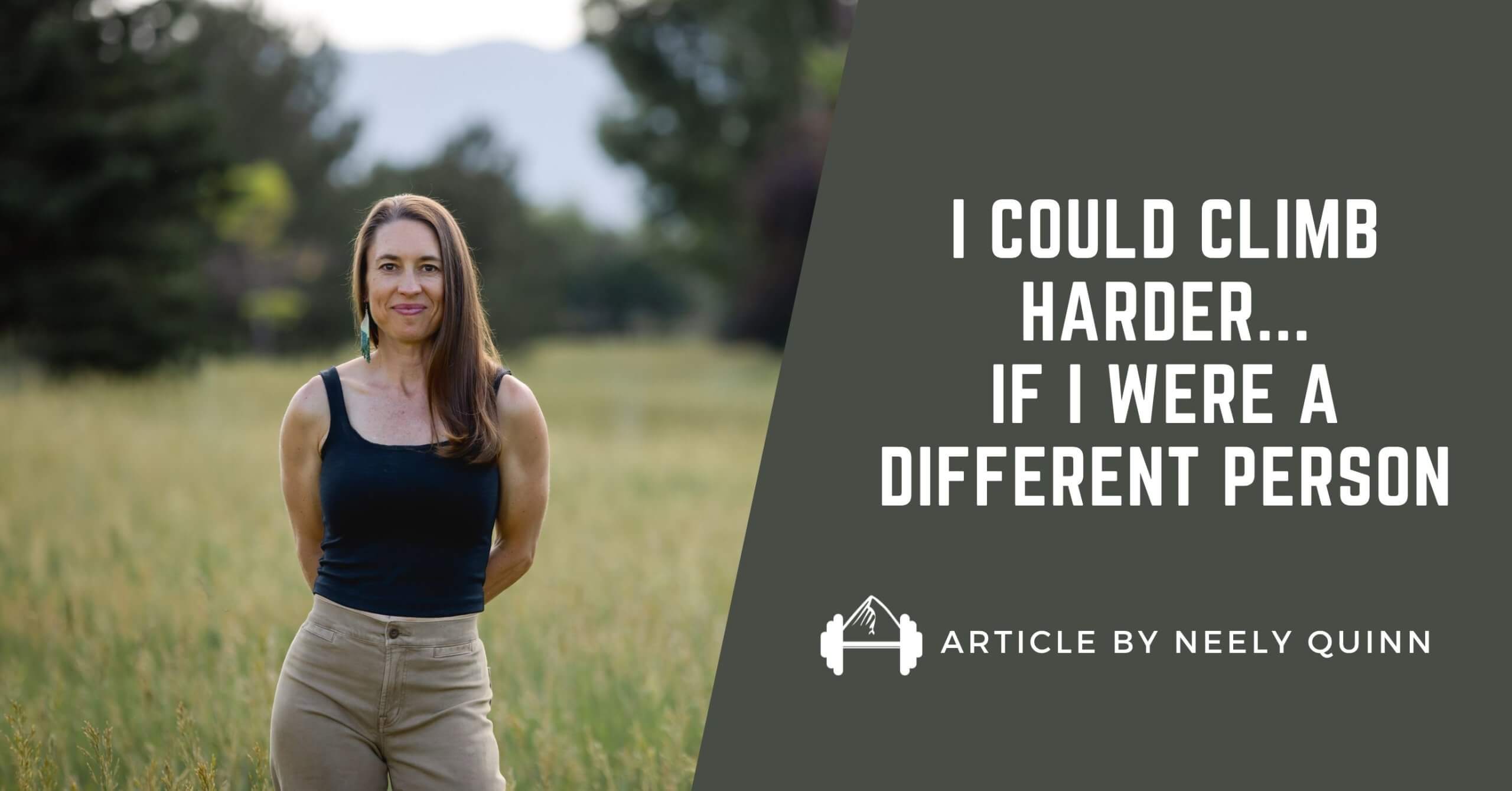If you would rather listen to this article than read it, here is the audio version:
It was 2019 and I was on my 9th attempt on Super Tuscan, a 5.13b at Seal Rock in the Flatirons of Boulder. I’d made it through the bottom bouldery crux all the way to the top crux 90 feet up and fell making a a big move to a sloper. It was a new highpoint for me, but I was devastated.
I screamed obscenities while I was falling, then sat on the rope yelling more obscenities aimed at my own incompetencies, the conditions, and the unfairness of it all. I was furious. I was crying. And I was unresponsive to my belayer’s questions about what I wanted to do next. When I finally gathered myself enough to speak, I asked to come down, then sat at the belay for the next hour, fuming. I complained a lot, I cried a lot, and my husband (my belayer) eventually gave up trying to console me.

Super Tuscan in all its beauty (I didn’t get any photos of me on it)
That is the definition of a wobbler.
And embarrassingly, I’ll admit that I’ve tossed my fair share of them over the last 25 years in a similar fashion. Looking back on this, I can’t even believe that I used to behave this way. First and foremost, it was unfair to my partners (I only did it with a select few lucky people, but to those people, I deeply apologize). Secondly, that mindset that led me to explosive outbursts was one of the main causes of my high anxiety levels in every area of my life.
I cared a LOT about sending, sending quickly, and sending certain grades. It was high stakes for me because sending equaled respect equaled belonging, and it was a source of great shame and insecurity for me to fail when I thought I should be succeeding.
After I sat at the belay sulking for an hour, I stood up, proclaimed my readiness to try again, and sent the route with ease. My expectations of myself had peaked on my previous attempt, and they were at an all-time low on that final attempt. Which we all know leads to great things happening. Bottling that feeling of expecting so little from yourself is where the magic is.
Fast forward to a few weeks ago.
I was on my 9th attempt of No Excuse, a 5.13b at the Dungeon near Pine, Colorado. I’d made it through the bottom bouldery crux all the way to the top crux at 50 feet up and fell making a big move to an undercling. It was a new highpoint for me, and I was elated.
I screamed when I fell because I was trying so hard to make the move, then sat on the rope and took stock of what had just happened. I yelled down to my belayer (my husband), “That was really good!” referring to my highpoint. I was smiling and genuinely psyched. Just sort of perplexed about how I was going to make that giant move happen while pumped. I figured out some alternate beta, practiced it, then came down.
I waited an hour and sent the next go, letting out a little yelp and an “I’m so fucking psyched on that!” at the top because I was proud of myself for dedicating time and effort to something that was meaningful to me. I was proud of my mindset and how far I’ve come.
Having said that, though, later on that day and night, I was NOT replaying the send in my mind over and over like I used to. I wasn’t relieved that I never had to get on the climb again like I used to feel. I just wasn’t as attached to the actual send, and that felt incredibly relieving. I was simply grateful for the experience of working on the route. And happy about the send, of course, but it felt less weighty.

Me on No Excuse
There was no performance anxiety before I tied in (like there was on Super Tuscan), there was no fear that if I didn’t send, something bad would happen to my standing in the community. There was no attachment to sending because I truly enjoyed climbing on the route and didn’t mind coming to this beautiful place periodically to work on it. There was a lot of satisfaction in the process, too: I went from thinking the route was impossible the first time I tried the bottom boulder to memorizing every foot and hand placement, and even doing a big deadpoint to a hold while being blinded by the sun.
You can see there are a lot of parallels between these two climbs, which is why it stood out to me and why I wanted to write about it.
How Does This Relate to You?
Even if you don’t have audible, visible tantrums like I used to (I haven’t done that in a while now), you might be having tantrums in your mind. You might be kicking the wall and throwing your shoes in your imagination after you fall when you think you “shouldn’t” have, and that is potentially just as damaging to your mental health as what I was doing. You’re just sparing other people’s mental health by doing it silently, and even that is debatable.
And it’s not just about those moments during that particular day when you’re really upset.
- It’s about the anxiety leading up to the day you go out to climb on the route because you’re so worried you’re not going to send it.
- It’s about the self-loathing thoughts you have on a regular basis about all the ways you’re not good enough in climbing, your job, your other hobbies, your relationships…
- And the damage that does to your confidence and overall contentment with your life.
What is that constant feeling of not being good enough DOING to you?
Does it keep you up at night? Cause fights between you and your partner? Make you low-key dread going climbing? Contribute to a low-level (or high-level) state of anxiousness? Make you obsessed with losing weight at any cost in order to climb harder? Make you want to distract yourself with technology or drama whenever possible?
That’s what it was doing to me.
In the rest of this article, I’ll be sharing a couple of insights that I’ve used myself in order to come to a place of much less anxiety, much more contentment, and not caring but still very much caring about climbing. What I mean by that is that I still feel quite motivated to climb and I care about it a lot because it’s something I truly love to experience. But I’m not attached to sending projects or certain grades.
And I’m climbing very well (for me) while only climbing 3 days per week and not training at all. I feel strong, powerful, confident, and I have brain space to figure out nuanced beta that might have derailed me before. I think this is because I’ve learned how to try hard simply for the joy of trying hard, without expectations of myself.
This is what I want for you, too.
1) You Belong Just as You Are
The absolute most important thing I have changed in my mindset in order to come to a place of peace and fun with climbing is that it actually doesn’t matter how hard I climb. It doesn’t truly matter to you (my audience and friends), my family, my husband, and ultimately not to me either. And I surround myself with people who don’t give any shits about how hard I climb, and if they did, I wouldn’t surround myself with them.
If someone doesn’t accept me for who I am outside of climbing, I don’t accept them as a part of my circle. It’s as simple as that. A lot of people at the crag know who I am because of TrainingBeta and the podcast – I’m recognized often. This has caused me a lot of anxiety in the past because I feel like I need to meet or exceed their expectations of me as someone who runs a climbing training website and podcast.
But I’ve decided that it’s not up to me what people think of me, whether or not they respect my climbing, whether or not they feel like I belong in this community, or any of that. I just know that I have my people who I care about, I respect myself, and that is all that matters. If you are kind, accepting, and not competitive with me, I’m happy to welcome you into my circle of people who I feel belong with ME. But I’m no longer pining for strangers’ acceptance and belonging.
You don’t have to, either.
2) You Are Where You Are in Your Climbing: Accept It or Suffer
I wrote an article recently about climbers wishing away reality and not accepting where they’re at in their climbing. It’s called “I Could Climb Harder… If I Were a Different Person.” In the article I talk about the fact that we think things such as, ‘If I were less scared, I could climb harder,’ or ‘If I didn’t have this stressful job, I could climb harder,’ and then we shame ourselves for not, well, climbing harder.
This denial of reality just causes suffering and we need to stop doing it – not just in climbing.
I want to get a little more personal with this one to illustrate exactly what I mean. I had a major epiphany recently about the fact that there are extremely valid reasons that I’m not climbing at the grades I thought I “should” be at this point. I’ve always had an arbitrary goal of climbing 5.13d, and definitely more 5.13c’s. I’ve felt like a complete failure at times because I haven’t done that, despite trying very hard to do so.
In 2010, I sent my first and only 5.13c. I was living in Rifle, climbing 3 or 4 days a week there for an entire summer. I wasn’t injured, I was highly motivated to suffer on smarmy, sandbagged rock climbs, I was the lightest I’d ever been because I was mildly starving myself, and I didn’t have a job. I was primed for sending hard shit, in other words. If my life had stayed magically like that from then on, yes, maybe things would have been different.
But let’s break down what actually did happen.
- 2011 – Start stressful job where I would sometimes work 100-hour weeks, wrote a book (The Complete Idiot’s Guide to Paleo)
- 2012 – Started TrainingBeta while living on the road in a van while also working the other job
- 2014 – First shoulder surgery, unable to climb hard or train for 18 months
- 2014 – Major depressive episode, not functional for 7 months
- 2017 – Second shoulder surgery, out of hard climbing for another 18 months
- 2017 – Major depressive episode, not functional for 5 months
- 2018 – Bought a house, remodeled it mostly ourselves, didn’t climb for months, my dad died
- 2020 – Wrist surgery, out of hard climbing for another 18 months
- 2021 – More wrist surgeries, soul dog died, got a psychotic puppy who took up all my time
- 2021 – Bought a house in Vegas, remodeled it, traveled back and forth between Colorado and Vegas
- From 2020 to present – 8-13 migraines per month, constantly searching for answers and relief
- INSOMNIA throughout
I’m absolutely not writing all of this out to garner sympathy from you. I don’t want that. The reason I’m writing it all out is because for the first time EVER about a month ago, I had sympathy and compassion for MYSELF, which is what actually matters. Up until this point, I’d been basically pretending like none of this had happened.
Like everything was just fine and I didn’t have any reasons to not be sending 5.13d or whatever.
That I was just a failure for not having done that, and there was so much shame around that. But when I really let myself see that all of this was going on for the past 14 years, I finally was like, ‘Ooohhhh yeah, of course you haven’t just been smashing goals left and right, Neely. You haven’t even been able to climb for part of that time. You certainly haven’t been able to train for a lot of it. You’ve had a lot going on.’
I realized that, in fact, what I HAVE accomplished in climbing during that time is nothing short of a miracle, and that just getting out of bed each day and being functional is a fucking monumental achievement with all the migraines. And I know I’m not alone here.
What Are YOUR Reasons?
What are your reasons for being exactly where you are right now, and can you be ok with that? If not, how can you work on being ok with that?
We all have stuff, some people more than others. I’m confident that there are people who just read my list of “stuff” above and said to themselves, ‘Girl, that’s nothin’. You should hear about my life,’ and rolled their eyes.
Yes, exactly! Really take that in and give yourself some grace about all the things you think you should be accomplishing! There are valid reasons why you are firmly where you are in your life. The choices you’ve made, the things that have happened TO you, accidents, family strife, job choices, illnesses, all of it. It’s real and it guides the paths our lives take, and that’s ok.
We can’t all be uninjured, unemployed, mentally healthy, highly confident professional climbers just perfectly poised to train and climb all the time, and if that’s what you think your life should be, please be more realistic.
This epiphany–that there are 100% valid reasons for being where I am in my climbing instead of where I thought I should be–has completely freed me from others’ expectations. Moreover, it has freed me from my OWN expectations. I am fully grounded now in my position as a climber and I actually don’t have shame about any of it anymore. I know where I belong, I know I’m doing my best, and I know that what I’ve accomplished in climbing is enough. And even if I hadn’t accomplished ANYTHING, I would still be enough.
Likewise, you belong, you are doing your best, and what you’ve accomplished is enough, no matter what you’ve accomplished.
We are not the sum of our accomplishments, after all. We are humans with inherent value, simply by existing. What I really hope is that you try to have more compassion for yourself with climbing and everything else in your life.
Work with Me on Your Climbing Mindset
Let me know what you think in the comments, and if you want to work with me on finding that self-compassion, you can sign up for a 15-minute introductory mindset session with me to see if we’re a good fit. I’d love to help you with your mindset in climbing – it’s one of my favorite things to talk about.






Leave A Comment